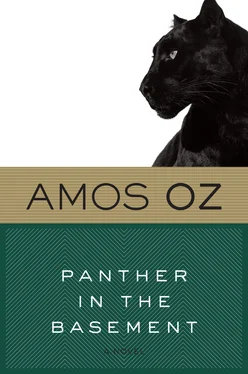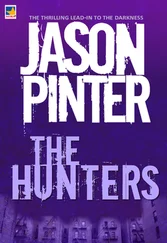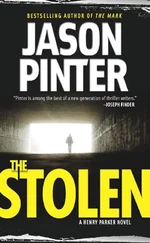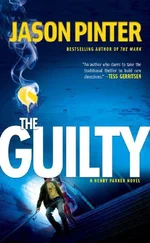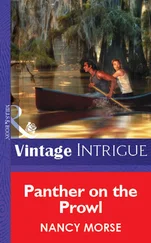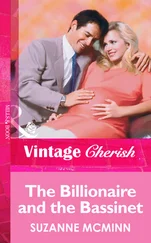Then Father would identify the dried stamps with the help of the thick English catalogue that had on its cover an enlarged drawing of the stamp with a black swan, the most valuable stamp in the world, even though its face value was only one penny. I would pass Father the transparent hinges on my outstretched hand, my eyes fixed on his lips. Father talked about some countries with polite loathing; others commanded his respect. He would talk about the population, the economy, the principal towns, the natural resources, the archeological sites, the political regime, the artistic treasures. He always spoke especially about the great painters, musicians, and poets, who, by his account, were almost all Jews, or of Jewish descent, or at least half-Jews. Sometimes he would touch me on the head, or on the back, groping inside himself for some stifled affection, and suddenly he would say:
"Tomorrow you and I shall go to the newsdealer. I'll buy you a pencil case. Or something else, if you like. You're not happy enough."
Once he said:
"I'm going to tell you something, a secret I've never told anybody. Please keep it just between the two of us. I'm a bit color-blind. These things happen. It's a hereditary defect. It looks as though you'll have to see some things for the two of us. Yes indeed; after all, you are imaginative and intelligent." And there were words that Father used without realizing that they made Mother sad. Carpathians, for example. Or belfry. Also opera, carriage, ballet, cornice, clock square. (What is a cornice, in fact? Or a gable? A weather vane? A porch? What does a groom look like? Or a chancellor? A gendarme? A bell ringer?)
According to our fixed agreement my father or mother would come to my room at precisely ten-fifteen to make sure I had really turned my bedside light off. My mother would sometimes stay for five or ten minutes; she would sit on the edge of my bed and reminisce. Once she told me how, when she was a little girl of eight, she had sat one summer morning on the bank of a stream in the Ukraine, next to a flour mill. The water was dotted with ducks. She described the bend in the river where it disappeared into the forest. That was where things that the water carried away always disappeared: b^k from trees or fallen leaves. In the yard of the mill she found a broken shutter painted pale blue and threw it into the stream. She imagined that this stream, which came out of the forest and vanished into it again, had more bends inside the forest that completed a circle. So she sat there for two or maybe three hours, waiting for her shutter to complete the circuit and reappear. But only ducks came back.
At school she had been taught that water always flows downhill because such are the laws of nature and not otherwise. But surely in bygone times people believed in different natural laws; for instance, they believed that the earth was flat and that the sun went around the earth and that the stars were put in the sky to watch over us. Maybe the natural laws of our own time were also temporary laws, and would soon be replaced by new ones?
The next day she went back to the stream, but the blue shutter had not returned. On the days that followed she would sit and wait for half an hour or an hour on the bank of the stream, although she had worked out that the failure of the shutter to return proved nothing: the stream might well be circular, but the shutter might be stuck in the bank somewhere. Or in shallow water. Or it might already have floated past the mill, once or twice or even more often, but it could have happened at night, or at mealtimes, or perhaps it was while she was sitting waiting but at the precise moment it went past she had been looking up at a flight of birds and had missed it. Because large flocks of birds used to fly past in the autumn, the spring, even in summer, with no relation to the times of migration. In fact, how could you tell how big the circle was that the stream described before coming back to the mill? A week? A year? Maybe more? Perhaps at that very moment, when she was sitting on my bed telling me about the shutter, during the curfew in Jerusalem in 1947, the blue shutter from her childhood was still floating on the stream there, in the Ukraine, or in the valleys of the Carpathian Mountains, passing laundries, fountains, cornices, and belfries. Still floating away from that flour mill, and who could say when it would reach its furthest point and start its return journey? It might take another ten years. Or seventy. Or a hundred and seven. Where was that blue shutter when my mother told me about it, more than twenty years after she threw it in? Where exactly were its remains, its crumbled fragments, its rotting debris? Surely there must have been something left then. And there must be something left even now, the evening I am writing this, some seventy years since the summer morning when my mother tossed it into the stream.
The day the shutter finally returns to the point where my mother threw it in the water, beside the flour mill, it will not be seen by our eyes, for they will no longer exist, but by other eyes. The eyes of a man or woman who will be unable even to imagine that the object floating on the stream came from here and has now returned. What a pity, Mother said: if anyone sees my sign floating past the mill again, if they even notice it, how will they know that it is a sign, a proof that everything goes around in circles? In fact, it is possible that the person who happens to be there on the very day and at the very moment when the shutter returns may also decide to make it a sign, to test whether or not the stream is circular. But by the time it comes full circle again that new person too will no longer exist. Another stranger will stand there and again won't have any idea. Hence the urge to tell.
My trial for treason in the Tel Arza Woods lasted less than a quarter of an hour, because we were afraid of being overtaken by the curfew. There was no interrogation under torture and no barrage of insults. It was a cool and fairly polite trial. Chita Reznik opened it with the words:
"The accused will stand." (A film starring Gary Cooper as a rogue sheriff from Montana had been showing at the Edison Cinema. My hearing was based on the lightning trial of the bandit sheriff.)
Ben Hur Tykocinski, the presiding judge, prosecutor, examining magistrate, sole witness, and legislator, spoke without moving his lips:
"Proffy. Member of the High Command. Second in command and chief of operations. A central member of our organization. A capable man. Worthy of special approbation."
I murmured:
"Thank you, Ben Hur." (I was so proud I had a lump in my throat.)
Chita Reznik said:
"The accused will speak only when he is asked to do so. The accused will now be silent."
Ben Hur answered him:
"Be quiet yourself, Chita."
After a moment's silence Ben Hur spoke a painful sentence with only three words:
"What a pity!"
He was silent again. Then, pensively, almost compassionately, he continued:
"We have three questions. The court will determine the punishment on the basis of the frankness of the answers to these questions. It will be very much to the accused's advantage to answer accurately. What was the motive? What did the enemy learn? And what was the reward of betrayal? The court will appreciate brief answers."
I said:
"OK. It's like this. A: I'm not a traitor. On the contrary. I got important information out of the enemy under the guise of exchanging Hebrew and English lessons. That's point A."
Chita Reznik said:
"He's a liar. He's a low-down traitor and a liar."
And Ben Hur:
"Chita: Final warning. Accused: Continue. Even briefer please."
I continued:
"OK. B: I didn't inform. I didn't even give my name. And definitely not a hint about the existence of the Underground. Shall I go on?"
Читать дальше
